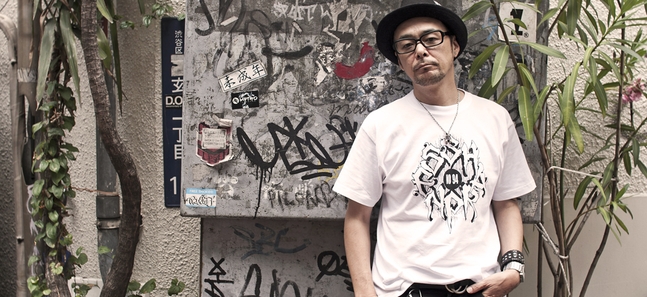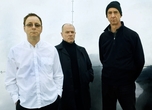DJ Krush: the interview
20 years and counting for Japan's most famous hip-hop export

Posted: Tue Jul 26 2011
Part one | Part two
Japanese hip-hop travels best when it keeps its mouth shut. While the nation's rappers have generally struggled to make much impact in the West, its producers and mixologists have fared better, be it turntablist turned fashion mogul DJ Honda, DMC champ DJ Kentaro or the late Jun Seba, better known as Nujabes. The most famous of all is DJ Krush, although he doesn't see himself as the best representative of the genre these days. As he tells Time Out, 'I chose freedom over being completely faithful to hip-hop. It's more fun that way.'
Born Hideaki Ishi, Krush dropped out of school and joined the yakuza, only to ditch gang life for boombox culture after watching cult 1983 movie Wild Style. He formed Krush Posse with MC Muro and DJ Go – later of Microphone Pager – in the late '80s, before embarking on a solo career in 1991. Krush's finely honed downtempo productions and virtuoso mixing techniques gained him attention in the UK, where he was championed by Straight No Chaser magazine and then signed to James Lavelle's influential Mo' Wax label.
Krush's career since then has seen him chalk up eight solo albums, as well as branching out into collaborations with a diverse range of artists. He's a member of Method of Defiance, the 21st century jazz fusion band led by bassist Bill Laswell, and regularly clashes with the likes of trumpeter Toshinori Kondo and tap dancer Kazunori Kumagai. Krush is also a founder member of JAG Project, a musicians' initiative to raise awareness about global issues including AIDS and the plight of former child soldiers in Africa.
This Friday, DJ Krush will be looking back over the past 20 years of music at an anniversary party at Liquidroom, where he'll be playing non-stop for seven hours – with a little help from his friends, of course. Time Out caught up with Japan's greatest hip-hop export, feeling tired and a little hungover, the day after a gig up in Tohoku.
You were in Sendai last night, right? How was that?
Everyone there has been really stressed out, so they were looking to let off steam. It was a good party. I was only there for a day, so I didn't get a very detailed feel for the situation, but it was like everyone was ready to burst from the stress. That's what they said to me: they don't know what they should do.
As a DJ, do you find that you play different music in that kind of situation?
If I thought about that too much, I'd become really rigid in the way I picked tunes. Rather than do that, I went about things the way I always do. I'm sure I played some really hardcore stuff, and some much softer stuff – I played both. I didn't worry too much [about the situation], I was just being me. I think if the promoters were wanting some specific music, they would've booked someone else.
The last time I saw you was at Freaks Music Festival, and you played a lot of drum'n'bass, which I wasn't expecting. Have you been playing a lot of different genres recently?
Yeah. There's loads of good music in each genre, so I'm trying to play a wide variety of things. As long as I'm able to do it in my style, then it's all good. A lot of people probably stopped dancing and were like, 'Huh, he's playing this?' They might have felt a little betrayed.
When you started playing drum'n'bass in your sets, did you have to spend a lot of time practicing at home first?
I'd do a certain amount of groundwork at home, and figure out how I was going to fit it all together. That's very important. I don't want to do what other DJs do. I think if that 'DJ Krush taste' comes through in the track selection, that's great.
You've spoken about how you got into hip-hop after seeing Wild Style. Do those early influences still have an impact on you now?
Hip-hop was a really important catalyst for me, but nowadays I'm not too hung-up about it. I feel like I'm not working in the genre of hip-hop, I'm in the genre of DJ Krush. If you're talking about inspiration, there's a lot of interesting music out there: jazz, techno, drum'n'bass, dubstep. I'm not a hip-hop purist – that's just where my roots are. There are people who've progressed along the hip-hop path, but I started off on that path and then took a detour.
Do you think hip-hop's got less interesting?
There aren't as many tracks that really blow me away. It used to be more interesting.
I first came here in 2002, and hip-hop was a lot more popular then.
Yeah. But it's spread to a lot of countries since then. There are lots of types of hip-hop. I came up from the street, so I've got a lot of time for things that are from the street, that are real. If it's about money, or cars or women, I'm not all that interested.
As it gets bigger, a lot of countries that used to imitate American hip-hop have developed their own unique styles. I'm from England, and hip-hop used to be a bit of an embarrassment, but then you got grime, and Roots Manuva…
Japan was like that, just imitating America, but people developed their own styles. England was like that, too: you had Derek B and Cash Crew. It can't be helped, really, but if you're going to imitate American music, you should just listen to American music. There's no need to make it yourself. People here were awful: they went to tanning salons to make their skin darker, they got their hair in Afros. I don't like that.
The first time I heard of you was in the mid-'90s, when you were releasing on Mo' Wax. Were you surprised when you first started making waves overseas?
Yeah, I was surprised. When Mo' Wax released my stuff, and I went to England to play live for the first time, there were people in audience who looked like they were praying. I realized they were really listening. That made quite an impact on me. This was around the time of Strictly Turntablized, which I felt was kind of different from hip-hop – I really wasn't sure if it would do well or not. But people in England were listening to lots of different music then – what with drum'n'bass and all that – so they came to it with open minds. I think [my success as] DJ Krush owes a lot to that. I owe a lot to England. That's where people first took to my sound.
Continue reading DJ Krush: the interview
Part one | Part two
Tweets
- About Us |
- Work for Time Out |
- Send us info |
- Advertising |
- Mobile edition |
- Terms & Conditions |
- Privacy policy |
- Contact Us
Copyright © 2014 Time Out Tokyo














Add your comment